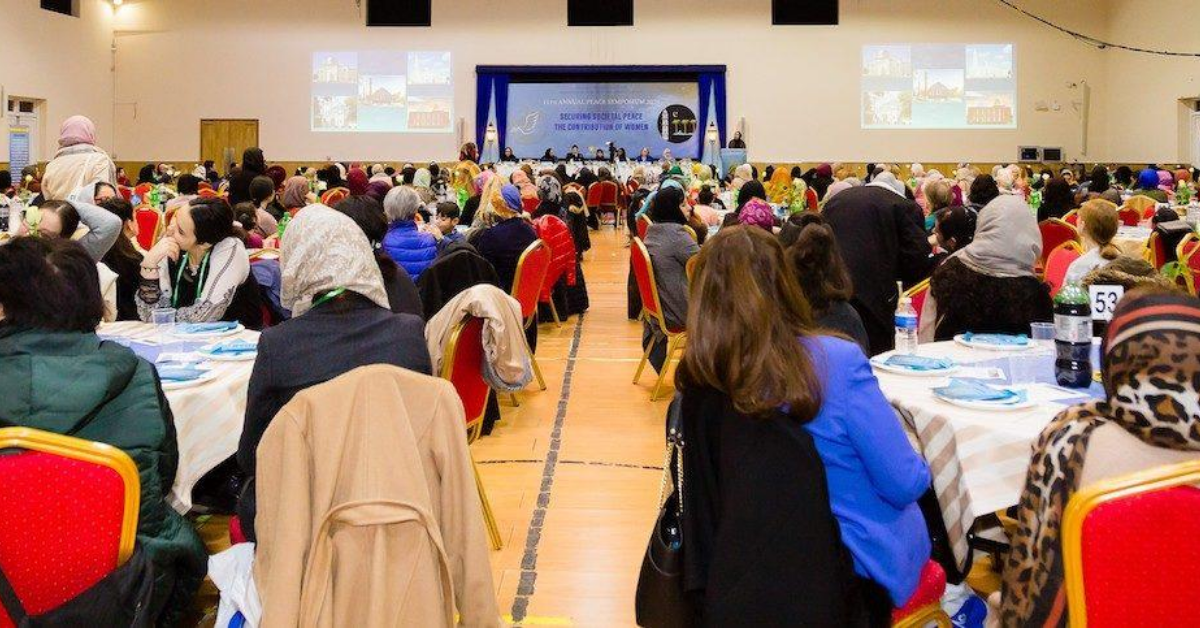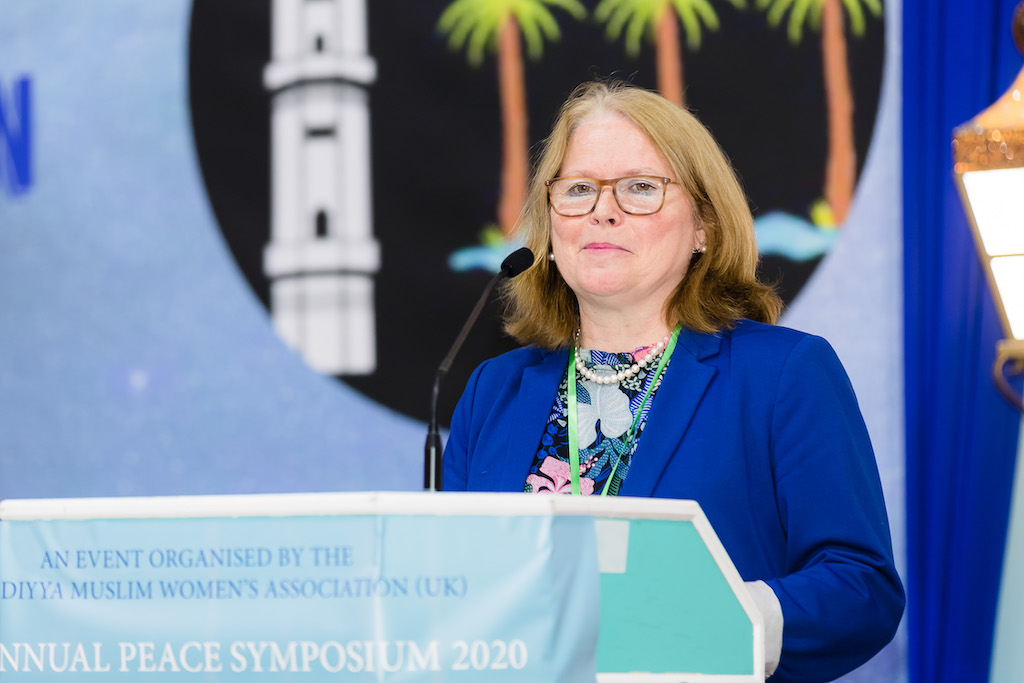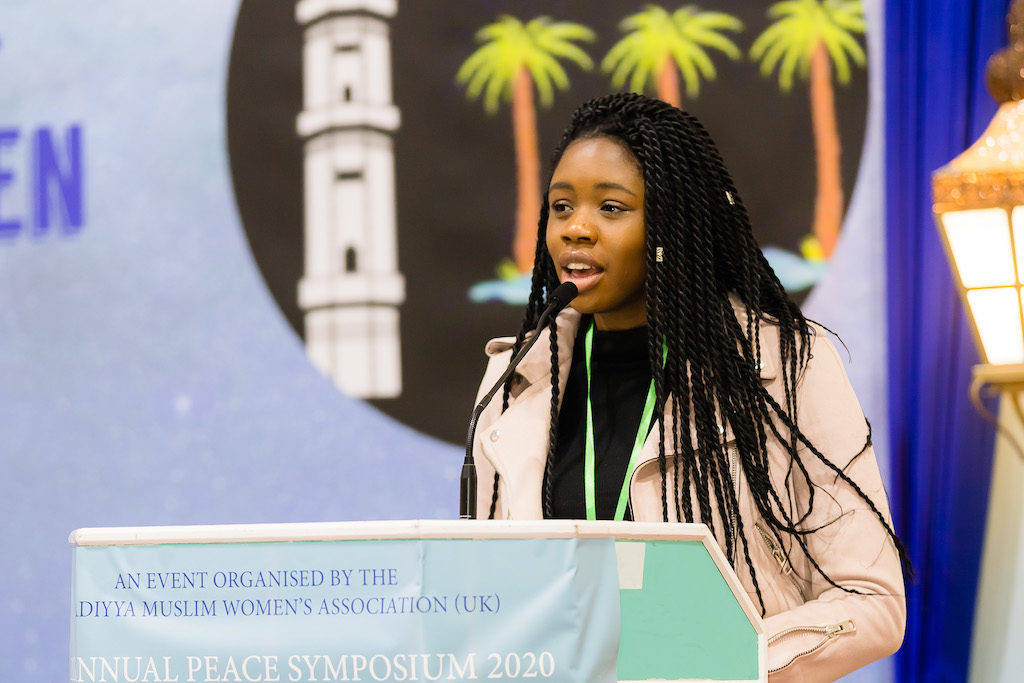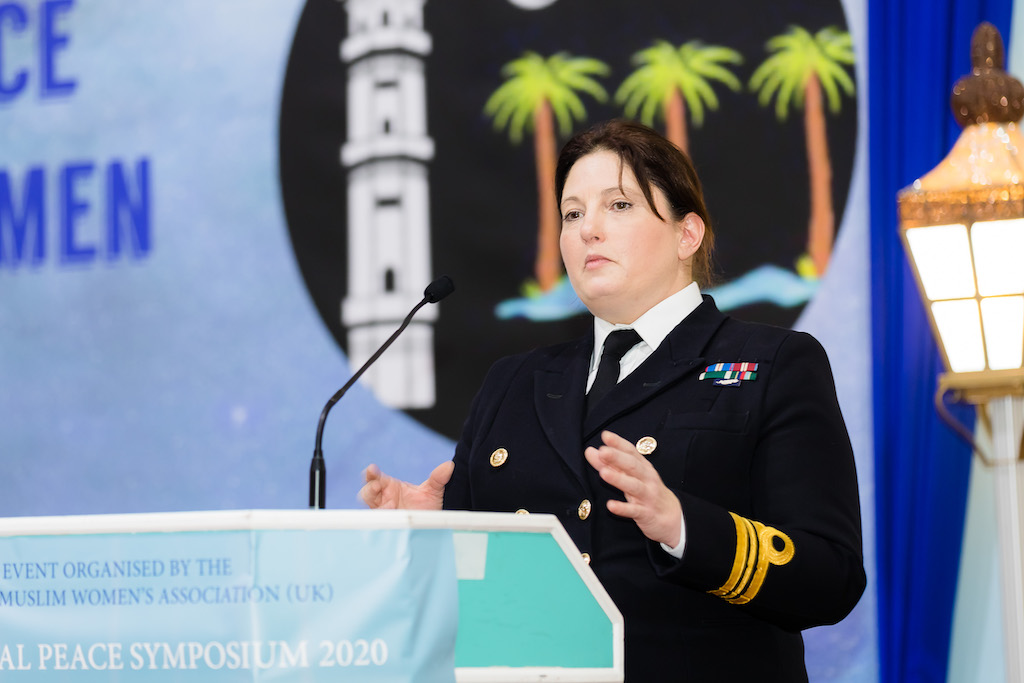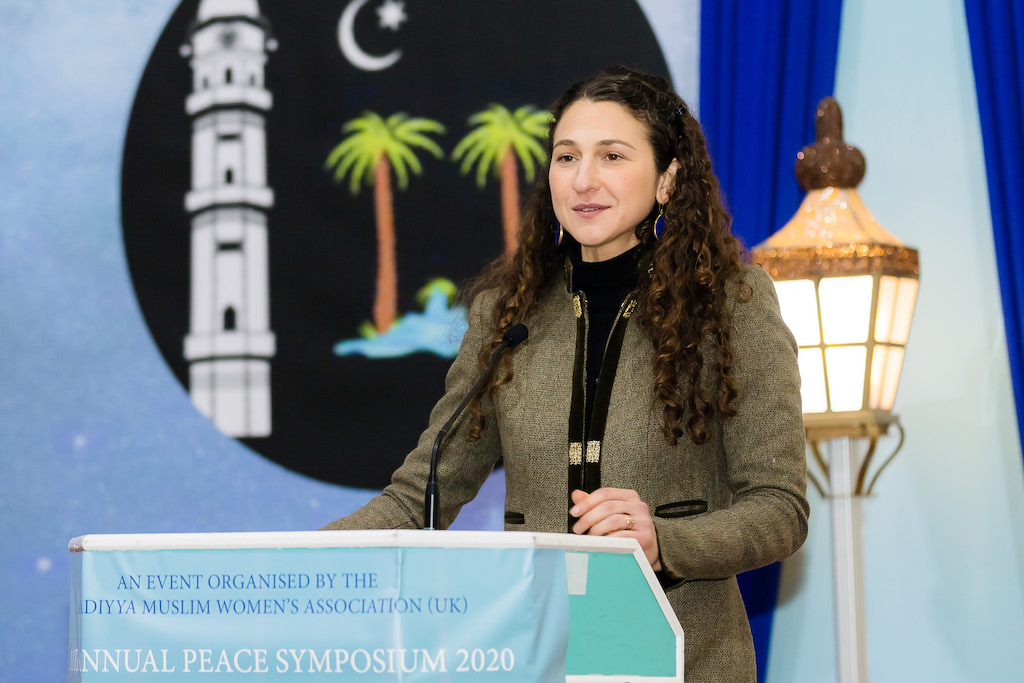A diverse group of over 400 women came together at the 11th Annual Peace Conference held by the Ahmadiyya Muslim Women’s Association UK on Saturday to discuss the contribution of women in establishing a peaceful society.
The women only conference was held at the largest mosque in Britain, Baitul Futuh in south London. Academics, charity workers, parliamentarians, civic leaders and representatives from faith communities were in attendance. The aim of this annual gathering was to inspire a concerted effort towards lasting societal peace.
Farzana Yousuf the Association’s National Secretary for Outreach and Community Relations welcomed the guests and gave an introduction to the Ahmadiyya Muslim Community, its principles and ethos and the work of the Ahmadiyya Muslim Women’s Association.
Karen Sanders, Professor of Politics and Communications at St Mary’s University, London, spoke about the role of communication in fostering peace. She said while it is a difficult skill and can be a challenge, it is a necessary characteristic for peaceful co-existence and that we can all learn to communicate better. Professor Sanders spoke about coding and decoding and said language, body language, tone and empathy are key to communication. Taking the trouble to learn a culture’s code shows respect and this is the basis for communication which arises from a true desire to understand and accept one another. Decoding or listening is another difficult skill. Attendees were encouraged to think about their LQ or listening quotient analogous to the IQ. Professor Sanders said God is the greatest communicator through scriptures, prophets and through us and that, we should all work to improve our communication skills.
Alice Coulibaly, international programmes officer at Peace Direct, an award-winning, international NGO supporting people in conflict environments, spoke about the efforts of women in countries including Somalia and Central African Republic. She described first-hand experience of women mediating between groups to resolve conflict. These are often women who are victims of conflict who have begun to lead the way. She described how, when women are involved in the peace process between two communities, the accords are longer lasting; and when women are excluded from the peace process, war often returns. Alice concluded by rallying every attendee to use their power to resolve conflict in their own way and to promote dialogue and justice in their lives.
Lieutenant Commander Suzanne Lynch with 30 years of Royal Navy service spoke about how the involvement of women has made the organisation more effective and diverse. Women add different values, different communication skills and different forms of empathy during times of conflict and are able to bridge divides that male colleagues are unable to. Whether protecting world food programme vessels or fighting piracy off the coast of Somalia women can be less confrontational and can get the job done efficiently. Female victims of violence feel more comfortable speaking to another female and females feel acutely the need to protect victims. The presence of women can have a positive influence in reducing hostility. Females have played an essential role over the last 20 years and are critical to promoting peace and adding to cognitive diversity of the organisation.
Shoshana Clark, CEO of Turquoise Mountain introduced the work of the charity in rebuilding the Old City of Kabul and saving the traditional craft industry. Using Samira, a young Afghan woman as a case study, Shoshana demonstrated that women can drive economic growth and can be ambassadors and artisans. A sense of collective pride is important for peace and young women are driving this sense of cultural pride. Women have an incredible role to offer in crafts, culture, children and community centres.
Dr Fariha Khan, President of the Ahmadiyya Muslim Women’s Association UK delivered the Keynote address and spoke on the Islamic perspective of women’s contribution to societal peace. Justice, opportunity, knowledge, understanding, tolerance and peace at home are all important to establish peace. In Islam great emphasis is laid on peace at home as the building block of all societies. Women can be the architects of peace in the home. Islam has given women a very high status. The Holy Prophet Muhammad, peace and blessings of Allah be upon him said that paradise lies under the feet of your mother. This also gives mothers the responsibility to create peace for the children. Education is essential in establishing peace and counteracts acts of aggression. Islam has encouraged the acquiring of knowledge especially for women.
Quoting the Khalifa, Hazrat Mirza Masroor Ahmad (may Allah be his Helper) Dr Fariha Khan said, ‘…Islam established the rights of women and girls for the first time. At a time when women and girls were discriminated against and looked down upon, the Holy Prophet of Islam instructed his followers to educate and respect girls. A path to heaven was through educating and instilling moral values in girls.’
Ahmadi Muslim girls across the world are educated and are given equal access. The literacy rate of Ahmadi girls in developing countries is at least 99%. There is a lack of justice in this world, different rules apply to different parts of the world. Racial equality was guaranteed by Islam 1400 years ago but the world has still not achieved it. Mothers play a vital role in educating children about values and social responsibility including climate change. Dr Fariha Khan concluded by talking about inner peace, and the Quranic verse: ‘…it is in the remembrance of Allah that hearts can find peace.’ God is the only source of true peace. May we all come together to help each other regardless of our differences.
Attendees were given guided tours of the mosque and a number of exhibitions and interactive displays were available including thee Al-Qalam project which encourages all participants to contribute a single verse of the Holy Quran so that the complete text of the Holy Qur’an is entirely handwritten by members of the public.
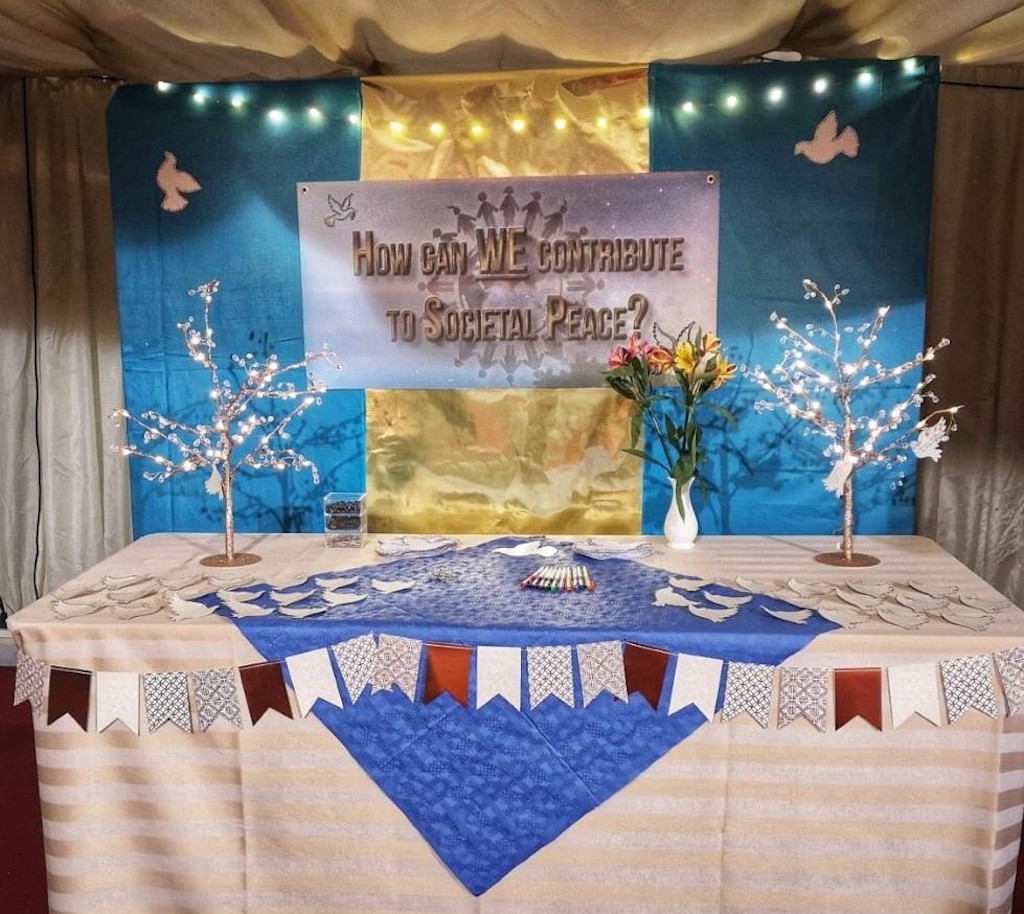
Media Contacts
Mrs Farzana Yousuf
National Secretary for Outreach and Community Relations
Ahmadiyya Muslim Women’s Association UK
Email: sectabligh@lajnauk.org
Tel: 07958 781 681
Mrs Shermeen Butt
National Press and Media Department
Ahmadiyya Muslim Women’s Association UK
Email: press.media@lajnauk.org
Tel: 07789 913 471
Notes for Editors:
The Ahmadiyya Muslim Women’s Association UK is a national Muslim Women’s group established in 1922 with more than 10,000 members across Britain. It is an auxiliary organisation of the Ahmadiyya Muslim Community UK which was established in Britain in 1913. The Community has approximately 33,000 members across more than 100 chapters. The Community built the Fazl Mosque in Southfields London in 1924 which was the first Mosque in London and also the Baitul Futuh Mosque in South London, the largest Mosque in Western Europe.
It was founded in 1889 by Hadhrat Mirza Ghulam Ahmad (peace be upon him) who claimed to be the Promised Messiah and Mahdi awaited by all major religions, including the Jews, Christians and Muslims. The Ahmadiyya Muslim Community is now established in 209 countries with tens of millions of members worldwide. Its motto is “Love for All, Hatred for None”.
The Ahmadiyya Muslim Community is the largest organised Muslim Community in the world and is led by a system of spiritual successorship known as Khilafat. Its current Khalifa is the fifth successor to the Promised Messiah (peace be upon him); his name is His Holiness, Mirza Masroor Ahmad. His title is Hadhrat Khalifatul Masih V.
